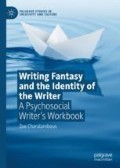Abstract
The third (“A List of 20 Instructions”) of the six exercises of this workbook is presented and the reader is asked to engage first. Data in relation to this exercise is discussed revealing its potential to produce two types of writing: “sensical” and “non-sensical,” potentially distracting some participants from their usual writing style. A third case study is presented to showcase a writing fantasy of a participant whose focus of writing is ‘the narrator figure.’ The participant’s engagement with the sequence of the six exercises and evidence in her spoken discourse about creative writing show that her writing fantasy was potentially expanded. Guideline questions at the end help the reader continue exploring their writing fantasy in their texts and responses about writing.
Access this chapter
Tax calculation will be finalised at checkout
Purchases are for personal use only
Notes
- 1.
Famous American poetry movement with emphasis on the sound and the beat of the writing.
- 2.
‘Metramorphosis’ is one of many neologisms used in Ettinger’s text (2006) to indicate the transformation (metamorphosis) in the womb (metra in Ancient Greek) (pp. 1–37).
References
Behn, R., & Twichell, C. (Eds.). (1992). The Practice of Poetry: Writing Exercises from Poets Who Teach. New York: Harper Perennial.
Ettinger, B. L. (2006). The Matrixial Borderspace. Minneapolis and London: University of Minnesota Press.
Kuhn, A. (2013). Little Madnesses: Winnicott, Transitional Phenomena and Cultural Experience. London and New York: I.B. Tauris & Co. Ltd.
Magee, P. (2008). Suddenness: On Rapid Knowledge. New Writing: The International Journal for the Practice and Theory of Creative Writing, 5(3), 179–195.
Wheeler, L. J. (1997/2014). ‘Narrator’ Entry in Literary Vocabulary. Online Resource: http://web.cn.edu/kwheeler/lit_terms.html
Author information
Authors and Affiliations
Rights and permissions
Copyright information
© 2019 The Author(s)
About this chapter
Cite this chapter
Charalambous, Z. (2019). What Does the Other Want?. In: Writing Fantasy and the Identity of the Writer. Palgrave Studies in Creativity and Culture. Palgrave Macmillan, Cham. https://doi.org/10.1007/978-3-030-20263-7_7
Download citation
DOI: https://doi.org/10.1007/978-3-030-20263-7_7
Published:
Publisher Name: Palgrave Macmillan, Cham
Print ISBN: 978-3-030-20262-0
Online ISBN: 978-3-030-20263-7
eBook Packages: Behavioral Science and PsychologyBehavioral Science and Psychology (R0)

